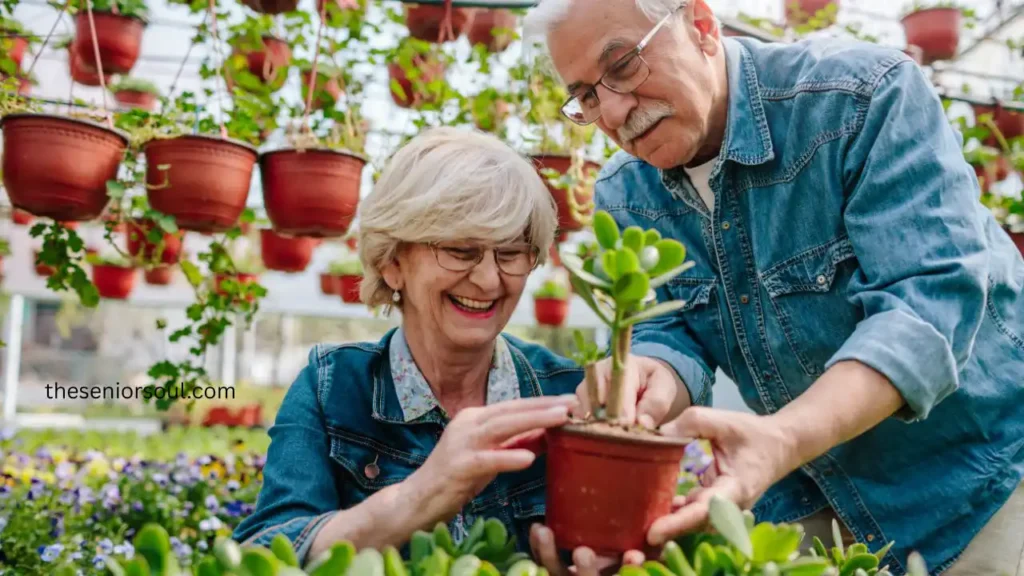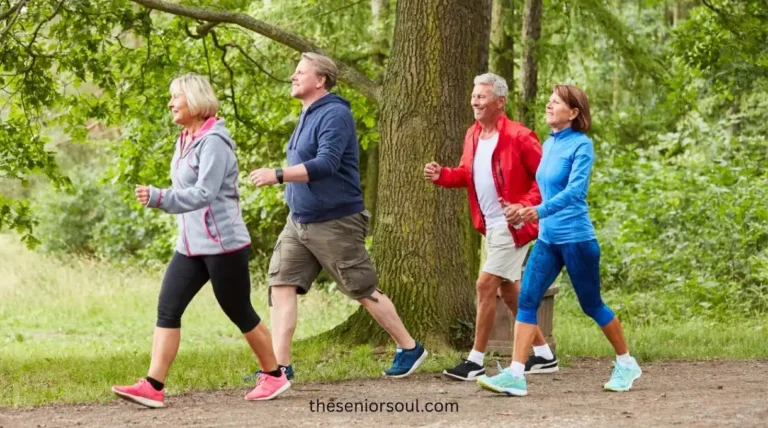How Quickly Can Gardening for Seniors Improve Your Strength?

Gardening for seniors is not just about growing plants. Gardening for seniors is about growing joy, purpose, and good health. I have seen how simple gardening activities can change lives. I will help you understand how you can do it safely and happily.
Table of Contents
Why Gardening for Seniors Matters
The importance of gardening for elderly is greater than most people realize. Maintaining an active lifestyle gets more difficult as we age. The strength of muscles deteriorates. Bone strength declines. Stiff joints are felt. The Centers for Disease Control and Prevention (CDC) report that each year, over one in four seniors falls due to frailty or poor balance.
A fun and safe method to get your body moving is through gardening. The mind is also sharpened by gardening. Seniors’ mental health and stress levels are improved by gardening, according to a 2019 study published in the International Journal of Environmental Research and Public Health.
Gardening is a form of self-directed therapy that you can perform whenever you want.
Aging Makes Physical Activity Harder
Aging brings real problems you cannot ignore. You may feel:
- Weak knees
- Back pain
- Less energy
- Fear of falling
- Loss of confidence in moving
Even simple things could be too much for you to handle. These factors drive many seniors to give up their interests. Joy is lost when one loses hobbies. Without happiness, mental health deteriorates.
I witnessed this happening to my uncle. He used to work his little farm. He was afraid to bend over and lift as he got older. He remained indoors. He had a bad mood.
Small Problems Become Big If Ignored
Avoiding physical activities like gardening causes minor issues to become more significant. You lose muscle mass more quickly. You become less balanced. You’re terrified to move even more.
Seniors who remain inactive lose between 3% and 5% of their muscle mass year, according to Harvard Health research. Loss of muscles results in hospitalization, falls, and a loss of independence.
You may believe that by staying inactive, you are defending yourself. The truth is, you are increasing your risk.
Also, mental health suffers. A 2020 study published in BMC Geriatrics discovered that seniors who are not active have a 28% higher chance of developing depression.
Imagine a world that becomes smaller every year. Reduced power. Diminished joy. Less autonomy. So you need to take action right away.

Start Gardening in a Senior-Friendly Way
You can take control. Gardening for seniors can be safe, easy, and deeply rewarding. Here’s how you can do it.
Choose Raised Beds and Containers
Seniors might benefit greatly from raised garden beds. The dirt stays off the ground in raised beds. Gardening does not need a lot of bending.
For instance, in her backyard, my neighbor put in wooden beds that are two feet high. Standing upright, she gardens. No sore back. No issues with the knee.
Pots are also an option. You can set them at waist height on shelves or tables.
For older gardeners, research indicates that raised beds increase accessibility and lessen strain (Source: Journal of Aging and Physical Activity, 2018).
Use lightweight containers, as a tip. For easier pot transportation, opt for plastic rather than clay.
Use Tools Designed for Seniors
It can be challenging to use common gardening tools. Seek out tools designed for senior citizens.
Bending is lessened by tools with long handles.
Your hands are protected from pain by ergonomic grips.
Materials that are lightweight make transporting simple.
As an illustration, my aunt uses a lightweight trowel with a soft, wide handle. Her wrists don’t hurt after hours of gardening.
Seniors who use ergonomic tools spend up to 40% more time gardening, according to research from the American Society for Horticultural Science.
Focus on Easy-to-Grow Plants
You don’t have to cultivate challenging plants. Select plants that are gratifying and simple.
Excellent illustrations for seniors:
Herbs such as rosemary, mint, and basil
Vegetables such as tomatoes, spinach, and lettuce
Flowers such as sunflowers and marigolds
For instance, I assisted a senior group in planting cherry tomatoes. After eight weeks, they were grinning and harvesting.
Quick success keeps you inspired. Complicated plants can be frustrating.
Set Up a Comfortable Gardening Space
Comfort is important. A well-designed area encourages you to spend time outside.
Make use of a stable stool or chair.
Use umbrellas or tiny tents to create spaces that are shaded.
Keep your tools close at hand.
For instance, we positioned a bench in the center of my dad’s garden. He converses with neighbors while sitting and trimming plants.
Fact: According to the National Institutes of Health, even 10 to 15 minutes a day in the sun raises vitamin D levels.
Every day, comfort takes you back to the garden.
Listen to Your Body
It should be enjoyable to garden rather than draining.
Work in brief increments. 15 to 20 minutes will do.
Prior to and following, stretch.
To stay hydrated, sip water.
For instance, when I go gardening, I set a timer. As soon as it rings, I stop.
Seniors should engage in moderate physical exercise for at least 150 minutes a week, according to American Heart Association research. Taking care of your garden is important.
By paying attention to your body, you can safely increase your strength.
Involve Friends and Family
When gardening alone, it might be isolating. Give it a sociable feel.
Get your grandkids involved in flower planting.
Join a garden club in your area.
Give your neighbors some produce or seeds.
For instance, I go to my father’s garden with my brothers every Sunday. We collaborate, laugh, and converse.
According to a 2021 study published in The Gerontologist, seniors who participated in communal gardening for seniors expressed greater levels of life satisfaction than those who did so alone.
Adapt When Needed
Change is nothing to be afraid of. Look for a simpler solution if anything gets challenging.
If kneeling is uncomfortable, use kneeling pads.
Install drip irrigation rather than lugging around bulky watering cans.
If it gets difficult to bend, grow vertical gardens.
Example: We erected a basic drip system after my father found it difficult to water. He only needs to press one button to water plants now.
Adaptation is not a sign of weakness but of strength.
Gardening for Seniors Grows More Than Plants
Seniors who garden gain confidence, joy, and strength. Aging-related issues are genuine. Ignoring them exacerbates the situation. However, gardening offers you a strong instrument to maintain your happiness and level of activity.
You now understand safe gardening practices. Raised beds, simple tools, well-chosen plants, cozy areas, and communal gardening all have a significant impact.
Begin modestly. Develop routines. When necessary, adjust.
Your garden won’t simply blossom. With it, your life will blossom.
RELATED POSTS
Why Is the Five Pillars of Aging the Secret to Healthy Aging?
51 Table Talks for Seniors to Stay Connected and Sharp
Why Are Virtual Activities for Seniors Gaining Popularity?
Frequently Asked Questions (FAQs) about Gardening for Seniors
What are the best gardening tools for seniors?
Lightweight, long-handled, and ergonomic tools are best. They reduce strain on the back and joints. Look for soft-grip handles and rust-resistant materials for easier use.
How can seniors garden safely?
Use raised beds, non-slip paths, and sit while gardening. Stay hydrated, wear sun protection, and avoid working during peak heat hours for maximum safety.
What are easy plants for seniors to grow?
Start with herbs like mint and basil, vegetables like lettuce, and flowers like marigolds. These plants are low-maintenance and grow quickly, bringing fast satisfaction.
Why is gardening for seniors good for health?
Gardening boosts physical activity, strengthens muscles, improves balance, reduces stress, and enhances mental well-being. It also increases exposure to sunlight, improving Vitamin D levels.
How can seniors modify their gardens?
Use raised beds, container gardens, vertical trellises, and automatic watering systems. These modifications reduce bending, lifting, and the need for heavy tools.
Can gardening for seniors help with depression?
Yes. Studies show gardening reduces symptoms of depression, improves mood, and creates a sense of purpose and achievement among seniors.
What are safe watering tips for seniors?
Install drip irrigation, use lightweight hoses, and water early in the morning or late afternoon. This minimizes physical strain and reduces water loss.
How often should seniors garden?
Short sessions of 15–30 minutes daily are ideal. Gardening 3–5 times a week helps maintain strength, flexibility, and mental clarity without overexertion.
How do raised beds help seniors?
Raised beds bring soil to a comfortable height, reducing the need to kneel or bend. They also allow better soil control and drainage for plants.
What are the risks of gardening for seniors?
Risks include falls, overexertion, dehydration, and sunburn. With proper planning like safe paths, hydration, and protective clothing, these risks are easy to manage.






